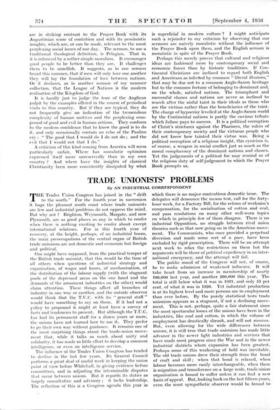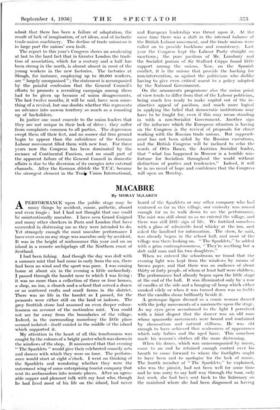TRADE UNIONISTS' PROBLEMS
By AN INDUSTRIAL CORRESPONDENT
THE Trades Union Congress has joined in the " drift to the south." For the fourth year in succession it hugs the pleasant south coast where trade unionists are few and industrial problems do not oppress the mind. But why not ? Brighton, Weymouth, Margate, and now Plymouth, are as good places as any in which to confer \Olen there is nothing exciting to confer about except international relations. For in this fourth year of recovery, at the height, perhaps, of an industrial boom, the main preoccupations of the central organ of British trade unionism are not domestic and economic but foreign and political.
One might have supposed, from the practical temper of the British trade unionist, that this would be the time of all others when questions of industrial strategy and organisation, of wages and hours, of mechanisation, of the distribution of the labour supply (with the stagnant pools of the depressed areas on the one hand and the demands of the armament industries on the other) would claim attention. These things affect all branches of industry in one way or another, and the outside observer would think that the T.U.C. with its " general staff " would have something to say on them. if it had not a policy to propound it might at least have a survey of facts and tendencies to present. But although the T.U.C. has had its permanent staff for a dozen years or more, the unions have not learned how to use it. They prefer to go their own way without guidance. It remains one of the most surprising things about the trade-union move- ment that, while it talks so much about unity and solidarity, it has made so little effort to develop a common intelligence, or even an intelligence service.
The influence of the Trades Union Congress has tended to decline in the last few years. Its General Council performs a great deal of useful work in keeping the union point of view before Whitehall, in giving evidence before committees, and in adjusting the interminable disputes that occur between unions. But it regards its duties as largely consultative and advisory ; it. lacks leadership. The reflection of this is a Congress agenda this year in which there is no major contentious domestic issue. The delegates will denounce the means test, call for the forty- hour week, for a Factory Bill, for the reform of workmen's compensation, for the socialisation of cotton and coal, and pass resolutions on many other well-worn topics on which in principle few of them disagree. There is no industrial Opposition, no struggle between rival union theories such as that now going on in the American move- ment. The Communists, who once provided a perpetual diversion and made some sort of a pace, have been excluded by rigid proscription. There will be an attempt next week to relax the restrictions on them but the arguments will be those of political expediency in an inter- national emergency, and the attempt will fail.
The public mood of the Congress will not, of course, be to make admission of weakened influence. It will take heart from an increase in membership of nearly 100,000 last year, and another 200,000 this year. The total is still below what it was in 1981, and only 55 per cent. of what it was in 1920. Yet industrial prodUction is at its highest level and more persons are in employment than ever before. By the purely statistical tests trade unionism appears as a stagnant, if not a declining move- ment. This is not, perhaps, quite a fair statement since the most spectacular losses of the unions have been in the industries, like coal and cotton, in which the volume of employment has drastically shrunk, and will not recover. But, even allowing for the wide differences between unions, it is still true that trade unionism has made little advance in the newer light industries and services that have made most progress since the War and in the newer industrial districts where expansion has been greatest. Perhaps some of this weakening of hold was inevitable. The old trade unions drew their strength from the bond of craft and skill ; when that bond is relaxed, when labour becomes more easily interchangeable, when there is migration and transference on a large scale, trade-union organisation is bound to suffer unless it can find a new -basis of appeal. But, looking back on the last fifteen years, even the most sympathetic observer would be bblind to admit that there has been a failure of adaptation, the result of lack of imagination, of set ideas, and of inelastic trade-union machinery. The decline of trade unionism is in large part the unions' own fault.
The report to this year's Congress shows an awakening at last to the hard fact that in Greater London the tradi- tion of association, which for a century and a half has been strong in the north, is almost absent in most of the young workers in the new factories. The factories at Slough, for instance, employing up to 30,000 workers, are " largely unorganised " ; the statement is accompanied by the painful confession that the General Council's efforts to promote a recruiting campaign among them had to be given up because of union disagreements. The last twelve months, it will be said, have seen some- thing of a revival, but one doubts whether this represents an advance into unwon territory so much as a rounding up of backsliders.
In justice one must concede to the union leaders that they are not unique in their lack. of drive ; they suffer from complaints common to all parties. The depression swept them off their feet, and no sooner did firm ground begin to appear than the subsidence of the German Labour movement filled them with new fear. For three years now the Congress has been dominated by the menace of Continental Fascism, and no small part of the apparent failure of the General Council in domestic affairs is due to the diversion of its energies into external channels. After the German de bdcle the T.U.C. became the strongest element in the Tralp Union International, and European leadership was thrust upon it. At the same time there was a shift in the internal balance of the British Labour movement, and the trade unions were called on to provide backbone and consistency. Last year the Congress kept the Labour Party straight on sanctions ; the pure pacifism of Mr. Lansbury and the Socialist purism of Sir Stafford Cripps found little support among the unions. Now, on the Spanish conflict, it is the unions that provide the backing for non-intervention, as against the politicians who dislike having to give even critical assent to a policy adopted by the National Government.
On the armaments programme also the union point of view tends to differ from that of the Labour politician, being much less ready to make capital out of the in- stinctive appeal of pacifism, and much more logical in applying the belief that democratic institutions may have to be fought for, even if this may mean standing in with a non-Socialist Government. Another sign of the influence which the European situation is having on the Congress is the revival of proposals for closer working with the Russian trade unions. But rapproch- ment has not been aided by the Russian executions, and the British Congress will be inclined to echo the words of Otto Bauer, the Austrian Socialist leader, that " what has happened in Moscow is a terrible mis- fortune for Socialism throughout the world without distinction of parties and tendencies." Indeed, it will be in no mood of hope and confidence that the Congress will open on Monday.







































 Previous page
Previous page